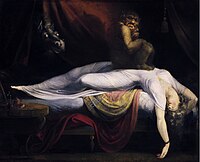
Photo from wikipedia
Sleep problems are amongst the most common triggers of migraine and non-migraine primary headache. Despite a majority of sleep problems being psychological in nature, there is a paucity of quantitative… Click to show full abstract
Sleep problems are amongst the most common triggers of migraine and non-migraine primary headache. Despite a majority of sleep problems being psychological in nature, there is a paucity of quantitative research on the psychological factors involved in sleep-related headaches. This is the first study to examine the link between maladaptive sleep beliefs and headaches. 542 participants completed an online battery measuring headache, sleep, and psychological distress. Avoidance of sleep-related headache triggers was associated with more headaches, as mediated by increased sensitivity to the triggers. Sleep quality, sleep beliefs, and sleep behaviours all significantly (p < .001) correlated with headache frequency and disability, with effect sizes ranging from small (rs = 0.16) to medium (rs = 0.37). Mediation models testing the effect of sleep beliefs on headaches via sleep quality (covaried by sleep behaviours) accounted for 13% and 14% of variance in migraine and non-migraine headaches, respectively (p < .001). Avoidance of sleep-related headache triggers was shown to be associated with greater headache frequency (via increased trigger sensitivity). It is posited that maladaptive sleep beliefs and behaviours may increase headache activity by causing poor sleep quality, leading to dysregulation in brain regions shared between sleep and headaches.
Journal Title: Behaviour research and therapy
Year Published: 2022
Link to full text (if available)
Share on Social Media: Sign Up to like & get
recommendations!